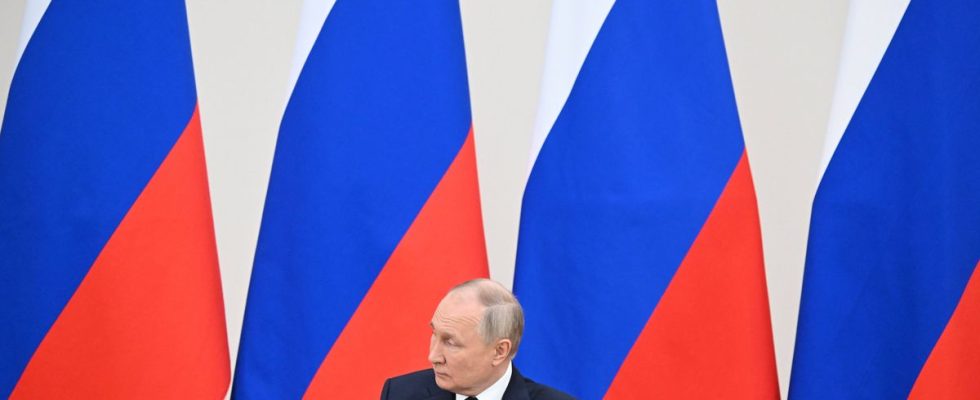It’s the race for American and European funding on kyiv’s side. And the race against time for Washington. Moscow is rubbing its hands. The context is perfect for Vladimir Putin and his press conference organized on Thursday, the first since the start of the conflict. Even if the exercise will be more of a simulacrum than a real confrontation with the press and the Russian people, it will allow the head of state to showcase his omnipotence in the face of a West that he considers weak.
Blockages that come at the right time for Moscow
Congress fails to agree on a new aid package for Ukraine. Without consensus by Friday, when parliamentarians go on vacation, the United States will run out of money to support the Ukrainian army. On the European side, accession to the EU and the approval of European aid of 50 billion euros will be on the menu at a summit in Brussels on Thursday and Friday. But things are stuck at the level of Hungary.
Favorable terrain for Moscow. Vladimir Putin “feels emboldened by what he perceives as a weakness of the West” namely the blocking of the American Congress but also that of the Hungarian leader Viktor Orban, analyzes Nicolas Tenzer, specialist in strategic and international issues and teacher at Sciences in. This reflects, for the Russian head of state, “a certain weakness of which he will try to take maximum advantage by strongly attacking Ukraine and continuing to propagate his propaganda to undermine morale”, adds the researcher. The Ukrainian capital is thus the target of an increase in attacks. On Wednesday morning, 53 people were injured in a nighttime missile attack. Moscow wants to strike hard at a time when the Westerners’ ability to support Ukraine seems to be weakening, after two years of war.
An international context advantageous for Putin
“Putin also benefits from horizontal wars”, namely the conflict in Nagorno-Karabakh, that between Venezuela and Guyana or even the behavior of Serbia, adds Nicolas Tenzer. The multiplication of open fronts, which involve, moreover, countries allied to Russia, “reinforces his idea that he can continue to put maximum pressure in Ukraine”, insists the teacher who believes that Vladimir Putin “is at the maneuver behind these tensions” emphasizing that “the concordance of the factors is striking”.
Indirectly, the conflict in the Middle East is also beneficial to him, “a front hostile to the West which allows the Russian head of state to strengthen his position in the decisive war: the war in Ukraine”, continues Nicolas Tenzer. Especially since the war between Hamas and Israel “puts Ukraine second in the priorities of the American government”, agrees Cyrille Bret, associate researcher at the Jacques Delors Institute, specializing in Russia. In parallel with these international tensions, the American elections and the economic recovery of Asia are, here too, part of the “exogenous factors favorable to the strategy” of Vladimir Putin, he summarizes.
A balance of power favorable to the Russian army on the ground
Volodymyr Zelensky may be touring the United States to try to convince Congress to vote for a new aid package, but the uncertainty remains. However, “we cannot win without help,” recalled the Ukrainian president. Indeed, “the Russians are regaining the upper hand on the ground due to the weakness of the Westerners,” notes Nicolas Tenzer. This American blockade “changes the balance of power of the Ukrainians against the Russians on the ground” where “a static war” has been set up with “a fixed territorial and strategic balance of force” and which can last “for years”, analyzes Cyrille Bret in turn.
The military counter-offensive launched in June by the Ukrainian army having not brought the hoped-for results, Volodymyr Zelensky is seeking to remobilize his allies among whom dissensions are appearing. But for Nicolas Tenzer, this “weakness” of the West “is not new, there has been a form of irresolution since the start of the war” on the part of Ukraine’s allies who “have not given enough weapons to enable strikes.
However, be careful not to be too defeatist. Russia is still far from declaring victory, a success which could also take many forms, from the territorial status quo to Ukraine’s non-membership in the European Union and NATO. “The defeatist discourse is also part of a strategy to weaken the morale of the adversary. Vladimir Putin is also playing on this to send this message: Ukraine cannot win the war,” warns Nicolas Tenzer.

